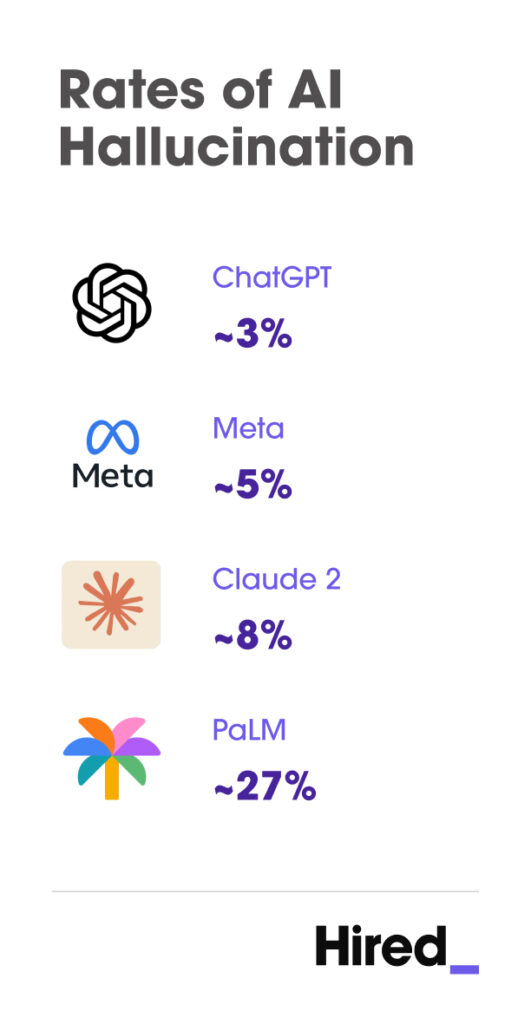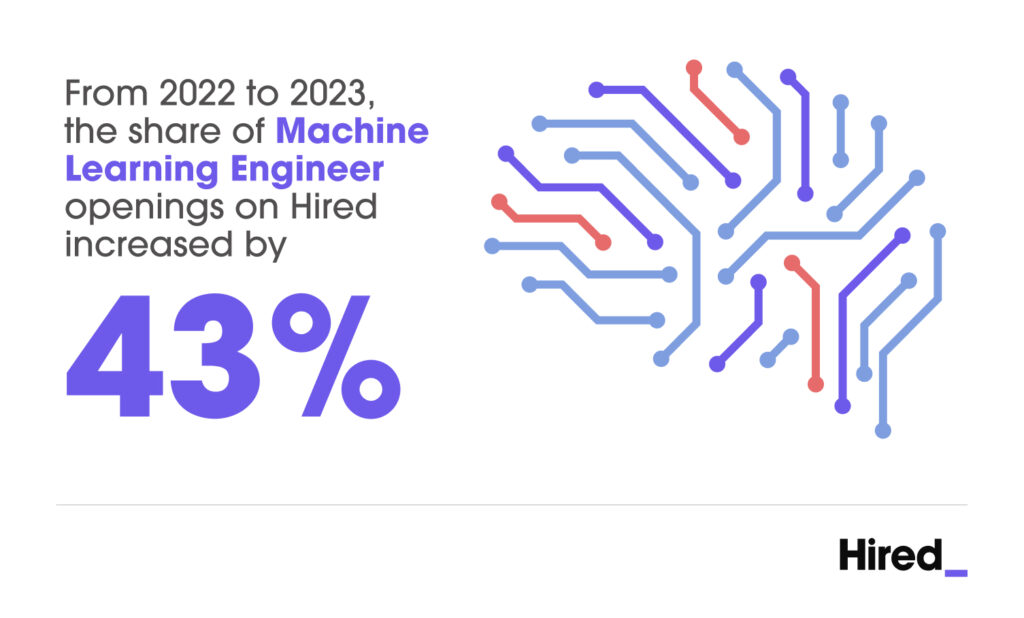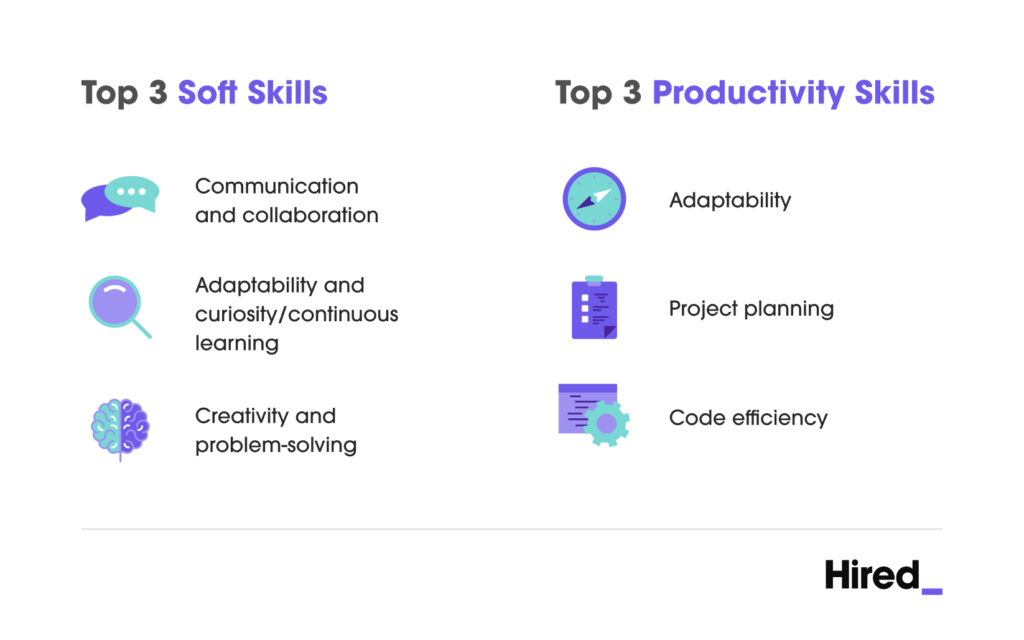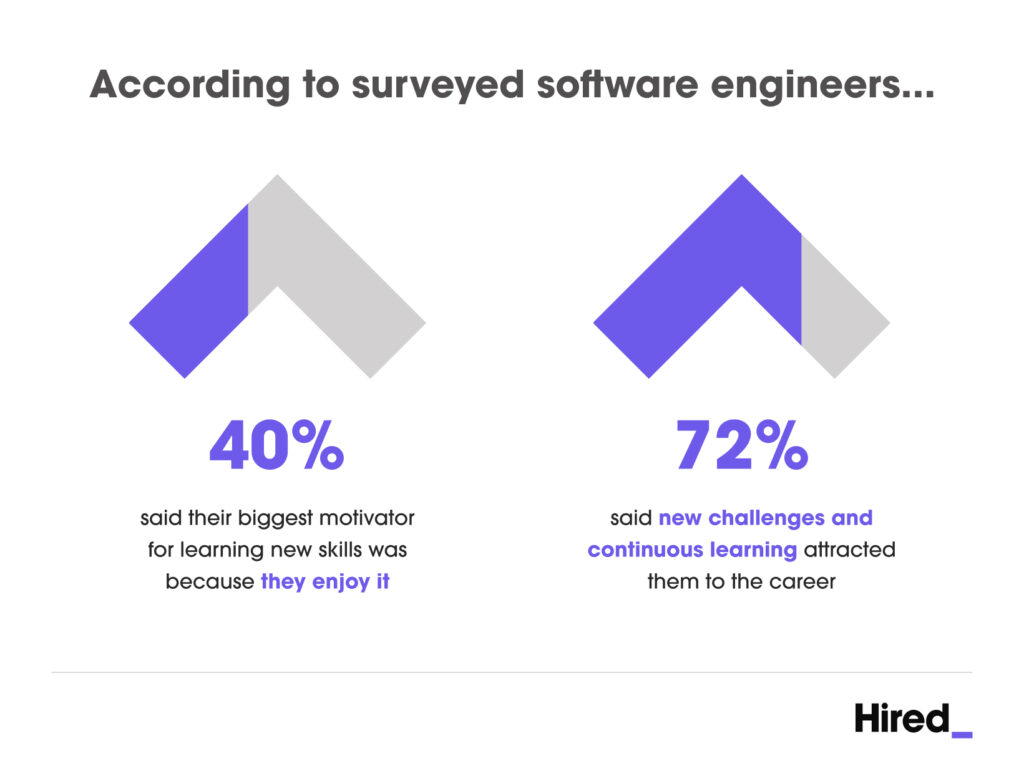New research for Employers & Jobseekers
Will AI Replace Programmers? New Expert Insights
Impacts of AI/GenAI on the software engineer job market and profession
Editor’s note: This is the third in a series on trends including developer specializations, tech skills, salaries, hiring locations, the push for RTO vs. the pull of remote, and more, including the impact of AI on software engineering. Will AI replace programmers? Read on…
It’s nearly impossible to discuss the current state of the tech job market without answering the question: will AI replace programmers? AI has only recently entered the conversation in a meaningful way. Yet, it’s everywhere — drafting messages on social networks, filtering applicants in recruiting tools, and coding alongside programmers on engineering teams.
Organizations of all sizes are eager to integrate new applications for AI into their products and services.
Hired surveyed tech employers in March 2024 and found 56% of respondents plan to incorporate or launch products leveraging AI tools this year.
As a result, job postings for Machine Learning Engineers, Natural Language Processing Engineers, and others with AI-related skills are on the rise.
Related: Trends in Software Engineer Specializations: 2024 Report
As with any technological advancement, AI provokes excitement, confusion, and trepidation. Because they can do more than just use AI — they can build it—software engineers are in a unique position, impacted by the new technology from all directions.
AI stands poised to alter how software engineers do their jobs, change the skills required to excel as engineers and transform what success in the tech industry looks like.
“AI is the next big disruptor of software engineering,” says Hired CTO Dave Walters. “It will empower engineers to focus more on innovation and move at a faster pace while AI handles routine tasks, accelerating development.”
Impact of AI on software engineers: AI as a toolEven among those who caveat their opinions with warnings about AI’s drawbacks, there seems to be broad agreement that AI can be a valuable tool for engineering teams.
By streamlining workflows, speeding up prototyping, automating repetitive tasks, and even writing code, AI has the potential to help teams work more efficiently and productively.
“Based on what I’m seeing and hearing,” says Walters. “The early adopters are leveraging AI to generate standard code blocks, which they optimize. AI is also great for generating documentation with less effort and parsing through data.”
GitHub CoPilot, for example, is a code completion tool that can make suggestions to developers in real-time, which can be particularly helpful for those working with blocks of boilerplate code.
Other AI tools can assist with debugging by spotting common or recurring code defects, speeding up the process and freeing up software engineers’ time for trickier portions of the codebase.
More examples of how software engineers are using AI as a tool
The practical applications of AI aren’t limited to the code itself — many tools can summarize meetings or generate documentation.
As Peter Bell, CTO at Engineer Access and Co-founder of Geeks Who Lead, explains, AI has many applications. “It’s not just code generation (which is still of variable quality), but also help with thinking through business challenges, coming up with requirements docs, collaborating with your team more efficiently, and generating documentation.”
Using AI to remove key blockers can help developers clear the way for deeper and more meaningful work.
According to Bohdan Zabawskyj, Founder of TrueNorthCTO, “AI tools such as Copilot will assist software engineers by making them more efficient at taking care of the routine tasks.
This allows them to focus on solving larger or more complex problems. Companies that use more automation and combine it with AI tooling will make their developers even more effective, helping them make a bigger impact with their work.”
Impact of AI on the software engineering industry: AI as a threatOf course, every new technology has its risks, and AI is no exception. Biased models trained on skewed data sets have made the news more than once, and depending on how information is processed and stored, there are concerns about privacy and security.
Even among those who are optimistic about AI, there is a keen awareness of the risks. “Software engineers must approach AI models and tools with an understanding of their limitations,” cautions Zabawskyj, “taking special care to address and mitigate issues related to privacy and data security.
As AI technologies can process personal and sensitive data, engineers should implement robust measures to protect this information and ensure compliance with relevant data protection laws and ethical guidelines.”
AI also raises questions of ownership and accountability — if code is written by AI, who owns it? — and concerns about false information.
Zabawskyj explains, “AI systems, while sophisticated, can sometimes generate misleading or entirely fabricated information — a phenomenon known as ‘hallucinations.’ These inaccuracies can arise from biases in the training data or the model’s inability to understand context deeply.”

Fact checking GenAI
According to reporting in the New York Times, Open AI’s ChatGPT technology, for example, makes things up about three percent of the time. Meta’s systems were around five percent. An OpenAI rival technology, Claude 2, offered by Anthropic was over 8 percent. Palm chat, a Google system, was the “overachiever” with a rate of 27 percent.
“Think of how often ‘auto-correct’ or predictive text is way off,” says Walters. “You wouldn’t hit ‘send’ without validating the results. Likewise, you shouldn’t blindly use GenAI material.”
Consequences if AI replaced programmers
Beyond the more universal concerns about AI, for software engineers in particular, there is a pervasive fear that organizations looking for cost savings, faster development or simplified management might rely too heavily on AI, replacing human engineers with machine learning models.
Code quality would suffer, creativity would decline, previously prized skills would become obsolete and developers would be out of jobs. While some software engineers may worry about the future of their careers, many experts agree. AI won’t replace software engineers — the jobs are simply going to change significantly.
“This is no different that what we’ve been seeing in software engineering for the past 20 years or more,” says Walters. “The job of a software engineer is constantly evolving. Those that want to remain relevant need to evolve with it.”
Related: 2024 Tech Hiring: 7 Ways to Stay Competitive in Tough Job Markets
The evolving role of Software EngineersAs AI becomes more prevalent, the role of a software engineer in an engineering organization will necessarily change. For example, developers will have more time to work on challenging and impactful projects in a more efficient environment.
Moving away from traditional coding tasks, their focus might change toward model development and data analysis.
RetailNext CTO and Techstars mentor Andreas Wilkens believes that as AI tools get more sophisticated, “actual coding knowledge will be less important than architectural knowledge… for the IC path.”
He says the emphasis for engineering managers will likely be “a blend of technology, people, and business leadership skills.”
AI and junior engineering talent
While some fear that jobs for junior engineers are most vulnerable to being replaced by AI-driven processes, others, like Zabawskyj, believe that AI could present an opportunity.
“For junior software engineers,” he explains, “AI offers tools and platforms to accelerate their learning curve and productivity. Automated code generation, bug detection and even sophisticated code suggestions may help them write cleaner, more efficient code from the outset.
AI can handle repetitive tasks, allowing junior engineers to focus more on learning complex coding techniques and understanding the nuances of software development processes.”
Wilkens agrees, confirming that in his experience, junior engineers “love [AI], as it gives them guidance and help with learning and getting up to speed.” On the other hand, he has seen that senior engineers often “see [AI] as more of a distraction than a help.”
AI and senior engineering talent
That might be because senior engineers will be responsible for ensuring AI is used intelligently and responsibly.
Zabawskyj explains, “For seasoned engineers, a deep understanding of software systems will be crucial in guiding AI’s integration into development processes, ensuring that AI tools are used effectively and ethically.”
As a result, the role of senior engineers will change, and “they might find themselves spending more time on tasks that require complex decision-making, creativity, and leadership. This may include architecting new systems, mentoring junior engineers, and making critical project management decisions.”
Impact of AI in engineering for businesses of different sizesJust as varying levels of developers will experience the impact of AI in different ways, so will businesses of different sizes. Will AI replace programmers in smaller or larger companies? Bell explains that “smaller companies have been quicker to adopt tools like Copilot and will be able to ‘punch above their weight,’ with small engineering teams having a bigger impact.”
In smaller, more agile organizations, key barriers to implementation are often lower, while the potential gains of increased efficiency, particularly when automating repetitive tasks, are high.
Larger organizations may experience more friction but have more budget to dedicate to specialized engineers and projects.
As Bell points out, “Larger enterprises will have to figure out how to deal with legacy systems and processes that might slow down software delivery, even if their engineers are more productive.”
The Impact of AI on tech skills for Software EngineersIt’s already evident that as more organizations incorporate AI into their development processes, their software engineering needs will change. With that comes a change in the desired software engineering specializations and skills, which we already see on the Hired.com platform.
Roles for Machine Learning Engineers, for example, are cropping up more frequently than ever before. From 2022 to 2023, the share of Machine Learning Engineer openings on the Hired tech recruitment platform increased by 43%.

Tech employers are also showing a growing interest in Security and Cybersecurity Engineers. Cybersecurity breaches have continued to increase, leading businesses and institutions alike to dedicate more headcount budget to these engineering specializations. Active postings for those roles increased by 30% from 2022 to 2023.
“Concerns about AI’s potential privacy and security risks have elevated these worries,” says Walters. “Just as legitimate businesses and software engineers have more tools now to drive performance and efficiencies, so do illegitimate businesses. AI has the ability to substantially increase of the volume and effectiveness of hacker campaigns.”
Just as the most in-demand specializations will continue to evolve, it’s expected that the most important software engineering skills will shift as AI continues to rise.
Our 2024 analysis of trends in software engineering skills indicated that while Python and AWS — perennially in-demand language and application skills — are still critical for both Machine Learning Engineers and Cybersecurity/Security Engineers, other skills, such as Machine Learning, (in general) are becoming increasingly desirable to employers.
Will AI replace programmers? Not with soft skills
Experts also agree soft skills like critical thinking, communication, leadership, and emotional intelligence will likely grow in importance for software engineers.
As Bell asserts, [those] soft skills will be key for anyone looking to future-proof their careers in the age of AI because “there will continue to be jobs available for engineers who can turn fuzzy business desires into executable specifications and explain what a feature does and why it matters to the organization.”
Hired survey data (March 2024) revealed employers feel the strongest skills needed for engineers to succeed are communication abilities and productivity skills.

Chris Daden, CTO at Criteria, a leading provider of multi-dimension pre-employment assessments, and Hired partner adds,
“As hundreds of impressive and easy to use AI models are introduced daily, the most sought-after skill will be the ability to manage and integrate these tools effectively. I anticipate that the ability to seamlessly “daisy chain” various AI tools together, using simple “drag and drop” workflow platforms, will become as commonplace and valuable as using any other mainstream technology.
The skill of orchestrating a cohesive AI strategy, seeing the value in each individual component, treating various tools like a toolbox, will be a highly prized capability in the future workforce.
To cut through the hype in AI, it’s critical that business value is delivered in a real and tangible way. This applies to all departments in an organization – Human Resources, Operations, Legal, Marketing, Engineering, Support and beyond.”
How to build effective teams in the age of AITo ensure they’re building teams ready for the AI age, tech leaders should begin by seeking candidates who possess key emerging coding skills combined with soft skills, like creative problem-solving.
On existing teams, it can be helpful to purposefully bring AI into the day-to-day, trying relevant new tools as they arise.
Wilkens, for example, made AI “a standing topic in my direct reports meeting.” He “encouraged everyone to contribute when they came across something and encouraged my reports and their teams to designate an engineer to test it out and give feedback.”
Leaders can also seek out their peers to learn from each other’s experiences by discussing the benefits, drawbacks and challenges of their AI tools. Industry publications and conferences can also be useful resources.
Most importantly, as Zabawskyj emphasizes, “fostering a growth mindset and culture of continuous improvement is key.
To prepare teams for the rapid evolution of AI technology, begin with a growth mindset. Believe in the ability to enhance skills and intelligence through effort. Then, combine that with continuous improvement in the pursuit of enhancing work and results.
Promoting this involves:
- Setting challenging goals
- Offering constructive feedback,
- Celebrating both successes and failures as learning opportunities
- Reflecting on lessons learned to improve future projects.
This approach keeps team members engaged and proactive in their learning and equips them to adapt to new technologies and methodologies as well as drive innovation.”
How to support software development teams upskilling in the age of AI“To truly harness the potential of AI, employers need to be willing to embed AI into the culture of the company,” says Daden. “This involves nurturing and fostering employees who want to explore AI.
Allow team members to experiment with the tools, come up with creative solutions to business problems, and showcase these successes internally to encourage others to get involved. Be sure to facilitate access to AI tooling and education.
You can also set up “lunch and learns” to pass on knowledge and encourage team members to play around with AI in a supportive setting.”
Conferences, courses, and professional communities are often significant sources of information. Some companies have learning and development budgets to cover related expenses.
If you don’t have one – why not? According to Hired research, the majority of software engineers, 40% said their biggest motivator for learning new skills was because they enjoy it.

“Software engineers are by nature, curious, creative problem solvers,” says Walters. “Give your tech teams the opportunity to do just that with professional development. It’s a win-win.”
Related: Software Engineer Tech Skills in Demand: Upskilling Support Advice
How to thrive as a Software Engineer in the age of AIAs an individual software engineer, the need for proactive, continuous learning is no less pressing, and even those who aren’t currently using AI in their organizations can benefit from seeking out opportunities to familiarize themselves with it.
Individuals can also create an internal channel for knowledge-sharing, exchanging learnings and insights with other interested developers in their organization.
Of course, there’s no substitute for personal, hands-on experience. Bell encourages engineers to “try different models, learn about the strengths and weaknesses of generated code, try to use LLMs to come up to speed with new languages and OSS code bases.”
It’s even beneficial to “experiment with AI in your personal life, whether it’s advice on cooking, exercise, playing guitar or dating. Learn how to prompt better and how to make the most out of models.”
Yet software engineers looking to succeed in the age of AI should look beyond models and code and remember to brush up on soft skills as well. Communication, problem-solving, and emotional intelligence will become even more critical in AI-driven environments.
Related: Ready to Start Programming with AI? A Quick Guide for Software Engineers
As Bell advises, “Invest in understanding both the problems your company solves and how businesses work in general. Over time, more engineering jobs will require a stronger degree of understanding of and empathy for end-user needs.“
Curious about AI in tech recruiting? Check out these resources
- Podcast: In this live recording of Hired’s podcast, Talk Talent to Me, Director of Talent Sourcing at Activision Blizzard Justin Ghio demonstrates how he and his team are using AI in recruitment.
- Blog: AI Leads to More Human-Centric Recruitment & Hiring (What!?)
- Podcast Recap: AI in Talent Acquisition, Talent Sourcing Analytics & More: Talk Talent to Me May ’23 Recap
- Podcast: Using AI Tools in Recruiting with Christina Pinheiro, VP of People and Talent at Sibros (now Chief People Officer for YMCA of San Francisco)
So, will AI replace Programmers and Software Engineers?
We need to foster a culture of continuous learning and evolution in software engineering,” advises Walters. “Whether we’re talking about cloud computing, mobile development, distributed teams, CI/CD, AI, or the next big advancement. If we as software engineers embrace change, adapt, and learn, we’ll continue to be successful members of our community.”
Though the details of AI’s exact impacts remain uncertain, one thing is clear — to succeed in the age of AI, individual software engineers and engineering organizations will need to adapt.
This adaptation will involve sharing knowledge, broadening their focus from coding to more complex aspects of problem-solving and design, and embracing soft skills. In addition, they’ll also need to embrace continuous learning and development, much like AI itself.
Key Takeaways from Will AI Replace Programmers?- AI as a Tool: AI serves as a valuable tool for engineering teams, streamlining workflows, automating tasks, and assisting with debugging, ultimately improving efficiency and productivity.
- Potential Threats: While AI offers significant benefits, there are risks such as biased models, privacy concerns, and false information generation, highlighting the importance of understanding limitations and implementing robust measures.
- Changing Role of Software Engineers: AI will reshape the role of software engineers, allowing more time for challenging projects and shifting focus towards model development and data analysis, with an increased emphasis on architectural knowledge and soft skills.
- Impact on Junior and Senior Engineers: AI presents opportunities for junior engineers to accelerate learning and productivity, while senior engineers will focus on guiding AI integration and complex decision-making, leading to a transformation in job responsibilities.
- Business Implications: The impact of AI varies for businesses of different sizes, with smaller companies benefiting from increased efficiency and larger enterprises facing challenges in integrating AI into existing systems and processes.
- Shift in Tech Skills: As AI becomes more prevalent, software engineering specializations and skills are evolving, with increasing demand for roles like Machine Learning Engineers and emphasis on soft skills such as critical thinking and communication.
- Strategies for Building Effective Teams: To build teams ready for the AI age, tech leaders should seek candidates with emerging coding skills and soft skills, encourage experimentation with AI tools, and foster a culture of continuous learning and improvement.
- Supporting Upskilling: Employers should embed AI into company culture, provide access to AI tooling and education, and encourage knowledge-sharing and experimentation among team members to facilitate upskilling.
- Thriving as a Software Engineer: Individual software engineers should engage in continuous learning, gain hands-on experience with AI, and develop soft skills like communication and problem-solving to succeed in the age of AI.
- Embracing Change: To thrive in the age of AI, software engineers and engineering organizations must embrace continuous learning, adaptability, and evolution, focusing on problem-solving, design, and soft skills alongside technical expertise.
Are you an employer ready for a better tech recruitment and hiring solution?
Hired offers several services and products to customize recruiting and hiring solutions for businesses of all sizes. Whether you’re a startup without a recruiting team or a global enterprise requiring greater efficiency and flexibility, we’re here to help with self-serve and supported plans.
Hired offers a talent pool of highly-qualified candidates from around the world. It provides employers with an easy-to-use platform, DEI features, response rates above 60%, and more efficiency through transparency into salaries and preferences.
Save time through greater alignment. No guessing, just better matches. Need help? We offer turnkey coding challenge campaigns to build your talent pipeline and surface even more candidates with tech skills in demand or hard-to-find specializations.
TA team stretched thin? Engineering managers busy managing? Hired also offers short or long-term talent sourcing services to screen and shortlist candidates.
Need assistance? Real human Customer Success Managers are available to help.
Check out our resources for employers and learn how Hired works for employers like you. Or, hear all about it when you…
Are you looking for a new role in software engineering?
Hired is a marketplace, which means we also help tech talent find new roles on growing teams. We promote talent to employers based on matching tech experience and skills, as well as salary and work model preferences. See how Hired works for jobseekers or sign up directly. There’s no cost to talent, from start to finish! We also offer career guidance and job searching resources.
If you’re already on the Hired platform see our partnership directory for opportunities to reskill or attend a bootcamp, . If you want to better showcase your skills – earn a badge for your profile using Assessments. Review our events page for upcoming coding challenges and webinars on demand.
For methodology, please see the main software engineer trends page.
